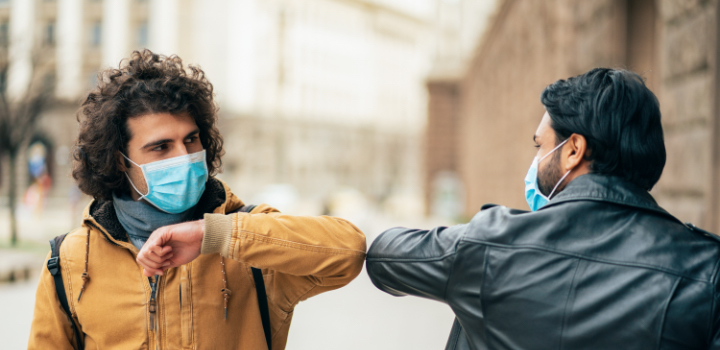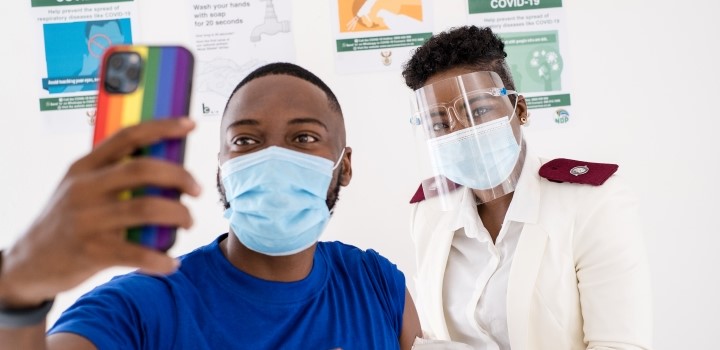Vaccine hesitancy: How to talk to friends, family and loved ones

There's so much misinformation out there that many people are still not convinced about having their COVID-19 vaccination. Some are filled with fear and doubt; others are sitting on the fence to 'just wait and see'. Here's how to have "the vaccine talk" with your friends, family and loved ones.
Local and international experts explain that the entire population benefits from a high vaccination rate, especially the most vulnerable and those who are most at risk for severe illness. In fact, the world is a far safer place when many people are vaccinated as this acts as a barrier to slow and prevent the virus from spreading (the so-called population immunity). Nevertheless, vaccine hesitancy is still something we must overcome. So how do you talk to friends, family and loved ones about this highly emotive issue?
How to have that conversation
- Focus on their emotions. Since COVID-19 vaccines are so new, it's normal for people to have doubts, fears and questions about them. The Centers for Disease Control and Prevention (CDC) and World Health Organization (WHO) say that because there is so much information as well as misinformation around, it can be quite overwhelming. So, always start the conversation by acknowledging the person's feelings so they know that you hear them.
- Don't argue or try to debate. You must create an open, safe space for someone to share their fears, thoughts and feelings. It shouldn't be an argument, and no one needs to win. Be aware of your tone of voice, facial expressions and body language (if you are talking in person).
- Listen without judgement and try to identify the root of their concerns You can ask open-ended questions to find out more about these concerns.The CDC explains that you must ask the questions in such a way that you get more than a 'yes' or 'no' response and that can help you to understand what they're worried about. So try saying "How did watching that news report make you feel?"
- Ask if you can share information Never bombard friends, family or loved ones with facts, especially if they did not ask for them. If they agree, they'll be more willing to listen to you instead of feeling overwhelmed by unsolicited facts, explains the CDC.Sharing quick, accurate answers to common concerns can go a long way to help build confidence. But always use reliable sources, and if you don't know the answers to any of their questions, offer to help with research and to admit that even science doesn't have all of the answers.
- Don't embarrass or shame. If they're not getting vaccinated because of something they read on an unreputable website (a website you cannot trust), don't shout them down. Rather try to demonstrate how it was spun a certain way, or help them to see why it's probably not a good source, advises The Henry Ford Health System. Then you can explain why sites like the CDC and the WHO may be better places to access the latest facts.
- Emphasise the positives to help them find their own reason to get vaccinated, suggests the CDC. Explain the main reason you want them to get vaccinated: That you're worried about their health and want them to be protected. So after addressing their concerns with empathy and facts, share what helped you to make the decision before trying to steer the conversation to what their life could look like after being vaccinated. This could be to protect their family, to visit elderly relatives, to get back to pre-COVID activities or to travel.
If they're still not convinced at the end of the chat, never show disappointment or anger. Tell them you respect their decision and give them space to process what was discussed. It may take time but show support that if they ever want to talk or discuss anything else about the COVID-19 vaccines, you are available. You can also point them towards additional information online such as:
Read more on Pfizer-BioNTech COVID-19 overview and safety..
Read more on Johnson & Johnson's Janssen COVID-19 overview and safety.

Visit our COVID-19 information hub
Everything you need to know about COVID-19 vaccines and the national rollout programme.
All medical information found on this website including content, graphics and images, is for education and information objectives only. Discovery publishes content to help to promote a better understand of COVID-19 and COVID-19 vaccinations. The content covered is an overview of key concepts and is not exhaustive in nature. We encourage further reading from other credible sources where necessary.
South African organisations:
- National Department of Health's dedicated COVID-19 portal: https://sacoronavirus.co.za/
- National Institute for Communicable Diseases' (part of the National Health Laboratory Service) dedicated COVID-19 hub
- South African Health Products Regulatory Authority (SAPRHA - part of the National Department of Health).
- South African Medical Research Council (SAMRC)
- South African Medical Journal (SAMJ)
International Organisations:
- Johns Hopkins University
- Harvard Health, Harvard University COVID-19 resource center
- Mayo Clinic COVID-19 resource center
- New England Journal of Medicine (NEMJ)
- US Centers for Disease Control and Prevention (US CDC)
- US Food and Drug Administration (US FDA)
- World Health Organization (WHO)